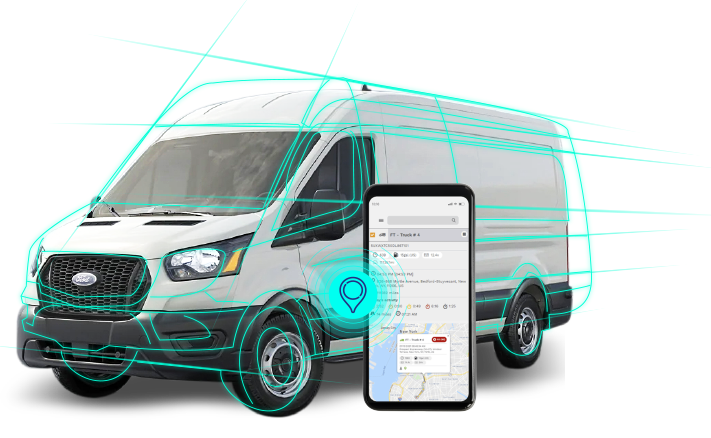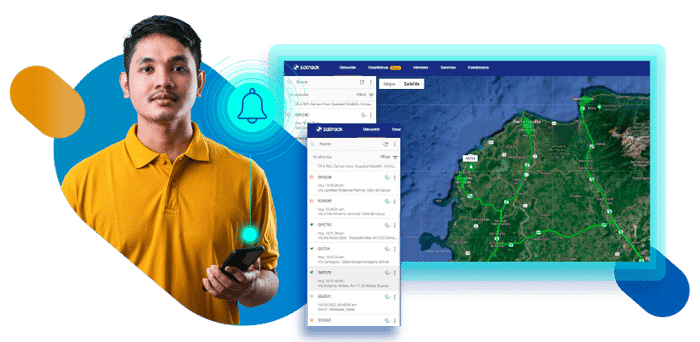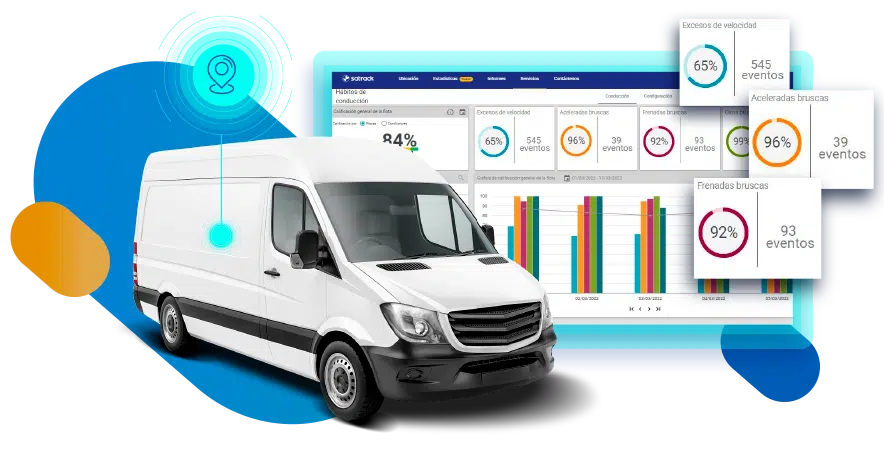
GPS Tracking System for Vehicles
Let’s look at how GPS tracking systems may help you improve the efficiency of your company’s fleet of vehicles.
What Is GPS Tracking for Cars?
A GPS tracker is a global satellite radio navigation system. It allows you to track your vehicles and drivers remotely. The system uses a transmitter within a navigation gadget or phone. It gives out a signal that is picked up by many satellites in space.

The Advantages of GPS Tracking Systems
GPS tracking systems can assist in simplifying operations and increasing efficiency. It essentially makes drivers’ and fleet managers’ lives simpler. Here are some of the most significant advantages of utilizing a GPS device.
Reduced Cargo Theft
Nothing deters burglars from stealing more than the possibility of being tracked down and convicted. If you discover your vehicle’s route has changed, you may utilize the notification prompts and mapping data to locate it and notify authorities so that it can be recovered quickly.
ncreased Productivity
The GPS monitoring system will keep track of your drivers’ movements and keep track of their exact positions. Because your drivers are being monitored, you will be able to measure how many hours every driver works and make sure that they are proactive, efficient, and offer great outcomes.
Customer Service Improvements
PS car monitoring and real-time vehicle tracking data can help you enhance customer service and gain a competitive advantage. You can provide precise predicted arrival times to your clients if you know exactly how far off your trucks are from their destinations.
Invoicing for Use
You may use GPS tracking to find out where your assets and vehicles are, as well as how long they’ve remained there. This is particularly advantageous for gas and oil firms. Invoicing needs accurate time-on-site calculations. You can simply handle billing, invoicing, and payroll with location-based data.
Minimized Detention Times
sing real-time vehicle monitoring and automatic geo-fencing warnings, you can simply determine when a motorist enters and departs a facility. This data can assist you in identifying inefficient shippers and receivers who hold drivers for excessively long periods.
Route Optimization
For most fleets, fuel is one of the most expensive operational expenses. You can concentrate on profitability by optimizing fuel consumption and eliminating waste. With fleet trackers and historical information, you may compare multiple routes. Determine how much gasoline each route consumes.
Ready to add a fleet data platform that drives a digital transformation?
Contact our sales team for a free demo and to discuss solutions that fit the needs of your business.
Route Optimization
GPS tracking may assist in determining the ideal and worst highways by examining information from previous travels utilizing the location history map. Fleet managers can spot congested roadways and optimize routes with location-based historical data. Route optimization can help drivers become more efficient and productive.
With all of these advantages, it’s difficult to overestimate the value of GPS tracking technology. With a sophisticated fleet tracking system, Satrack wants to assist you in gaining a better understanding of how your trucks are doing and develop better methods to manage workloads. Do not hesitate to contact us for a free GPS tracking demo today!
A GPS tracker is a global satellite radio navigation system. It allows you to track your vehicles and drivers remotely. The system uses a transmitter within a navigation gadget or phone. It gives out a signal that is picked up by many satellites in space.


Real-Time Automated Alerts
Because GPS tracking allows fleet managers to track vehicles in real-time, they can use virtual parameters to create geo-fenced notifications whenever a vehicle enters or exits a job site.
When you don’t need to manage your fleet of vehicles manually, you can more smoothly organize your operations and everyday tasks. Knowing where all of your vehicles are and receive automatic alerts when they enter or depart key locations can help you save time and effort.
For example, informing clients about delays is a big GPS tracking advantage. You can also send geo-fenced alerts to shippers or receivers if drivers are going to arrive at the site. With early alerts, processes may be sped up, productivity increased, and detention time reduced.
What Is GPS Tracking for Cars?
A GPS tracker is a global satellite radio navigation system. It allows you to track your vehicles and drivers remotely. The system uses a transmitter within a navigation gadget or phone. It gives out a signal that is picked up by many satellites in space.
The Advantages of GPS Tracking Systems
GPS tracking systems can assist in simplifying operations and increasing efficiency. It essentially makes drivers’ and fleet managers’ lives simpler. Here are some of the most significant advantages of utilizing a GPS device.
Reduced Cargo Theft
Nothing deters burglars from stealing more than the possibility of being tracked down and convicted. If thieves are aware that a car has a tracking device, they will abandon it and try another truck rather than risk being caught.
If you discover your vehicle’s route has changed, you may utilize the notification prompts and mapping data to locate it and notify authorities so that it can be recovered quickly.
Real-Time Automated Alerts
Because GPS tracking allows fleet managers to track vehicles in real-time, they can use virtual parameters to create geo-fenced notifications whenever a vehicle enters or exits a job site.
When you don’t need to manage your fleet of vehicles manually, you can more smoothly organize your operations and everyday tasks. Knowing where all of your vehicles are and receive automatic alerts when they enter or depart key locations can help you save time and effort.
For example, informing clients about delays is a big GPS tracking advantage. You can also send geo-fenced alerts to shippers or receivers if drivers are going to arrive at the site. With early alerts, processes may be sped up, productivity increased, and detention time reduced.
Reduced Fuel Consumption
For most fleets, fuel is one of the most expensive operational expenses. You can concentrate on profitability by optimizing fuel consumption and eliminating waste. With fleet trackers and historical information, you may compare multiple routes. Determine how much gasoline each route consumes. To save money on gas, choose the most efficient route. You may save operational costs by having better visibility into processes, location history, and better route planning.
Increased Productivity
The GPS monitoring system will keep track of your drivers’ movements and keep track of their exact positions. Because your drivers are being monitored, you will be able to measure how many hours every driver works and make sure that they are proactive, efficient, and offer great outcomes.
Customer Service Improvements
GPS car monitoring and real-time vehicle tracking data can help you enhance customer service and gain a competitive advantage. You can provide precise predicted arrival times to your clients if you know exactly how far off your trucks are from their destinations.
Invoicing for Use
You may use GPS tracking to find out where your assets and vehicles are, as well as how long they’ve remained there. This is particularly advantageous for gas and oil firms. Invoicing needs accurate time-on-site calculations. You can simply handle billing, invoicing, and payroll with location-based data.
Minimized Detention Times
Using real-time vehicle monitoring and automatic geo-fencing warnings, you can simply determine when a motorist enters and departs a facility. This data can assist you in identifying inefficient shippers and receivers who hold drivers for excessively long periods.
Route Optimization
GPS tracking may assist in determining the ideal and worst highways by examining information from previous travels utilizing the location history map. Fleet managers can spot congested roadways and optimize routes with location-based historical data. Route optimization can help drivers become more efficient and productive.
With all of these advantages, it’s difficult to overestimate the value of GPS tracking technology. With a sophisticated fleet tracking system, Satrack wants to assist you in gaining a better understanding of how your trucks are doing and develop better methods to manage workloads. Do not hesitate to contact us for a free GPS tracking demo today!
